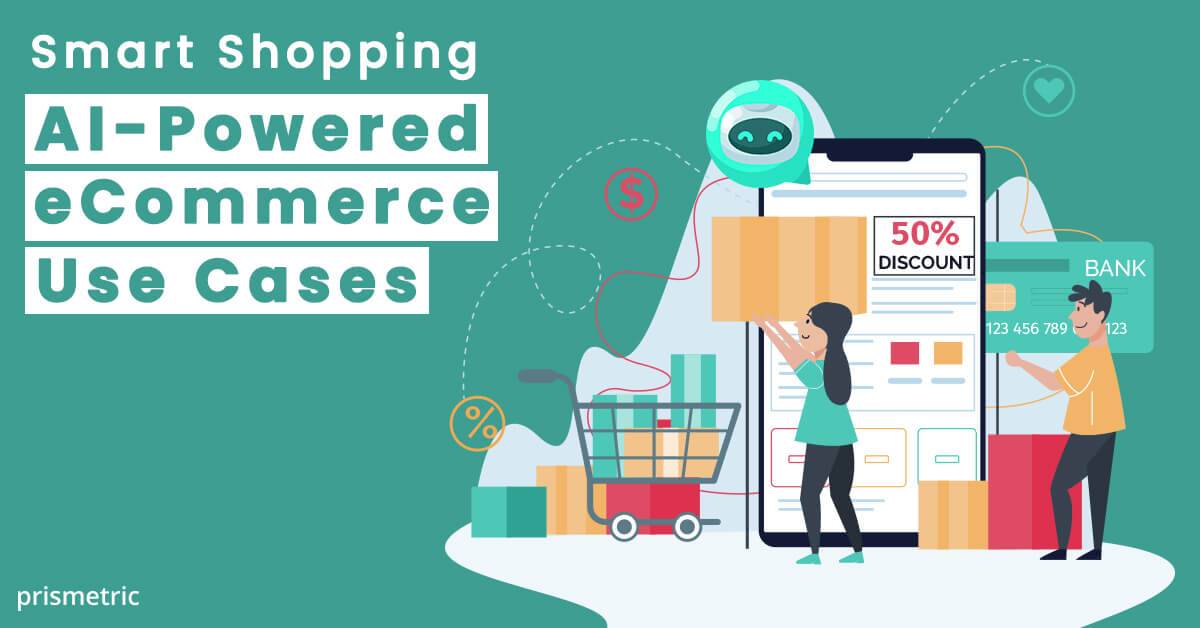The Future of E-Commerce: Dropshipping, AI Inventory, and Smart Stores
By Spenser Robinson - October 22, 2025

The world of e-commerce is in a constant state of flux, with new technologies and business models emerging at a breakneck pace. As we look towards 2026, the future of online retail is being shaped by powerful forces like dropshipping, artificial intelligence (AI), and the rise of smart stores. For novice designers and aspiring entrepreneurs, understanding these trends is crucial for building successful and competitive online businesses.
This article will explore the exciting future of e-commerce and how you can leverage these trends to your advantage, including a special look at how prebuilt store offerings can give you a head start.
The AI Revolution in E-Commerce
Artificial intelligence is no longer a futuristic buzzword; it's the new operating system for modern e-commerce. According to a report by Nordstone, by 2026, AI will power everything from autonomous shopping to hyper-personalized product experiences. This transformation is already underway, with AI reshaping how consumers shop and how brands sell.
Here are some of the key ways AI is revolutionizing e-commerce:
•Hyper-Personalized Shopping Journeys: AI enables a level of personalization that goes far beyond simple product recommendations. Imagine entire homepages customized for each user, with dynamic content and images that change based on their preferences and even real-world context, like the weather in their city. This level of personalization creates a more engaging and relevant shopping experience, which in turn drives conversions.
•AI-Powered Inventory and Logistics: Amazon is already using AI to manage its warehouses and predict regional demand. By 2026, this technology will be accessible to mid-size e-commerce brands, allowing them to automate restocking, optimize shipping routes, and reduce delivery times. This means you can operate with the efficiency of a logistics giant, without the massive budget.
•AI-Generated Products: In the near future, fashion and lifestyle brands will use AI to design and market products before they even exist. By generating realistic product imagery and copy, brands can test demand and gather feedback without the risk and expense of producing physical inventory.
The Enduring Appeal of Drop shipping
Dropshipping has been a popular e-commerce model for years, and its appeal is only set to grow. This business model allows you to sell products without holding any inventory yourself. When a customer places an order, you simply forward it to a third-party supplier, who then ships the product directly to the customer.
AI is also making its mark on dropshipping, with AI-powered tools that can help you identify trending products, automate order fulfillment, and even handle customer service. This makes it easier than ever to start and scale a successful dropshipping business.
Smart Stores and the Future of Retail
The lines between online and offline retail are blurring, with the rise of "smart stores" that integrate the best of both worlds. These stores use AI and other technologies to create a seamless and personalized shopping experience. Think autonomous checkout, interactive displays, and personalized recommendations delivered to your phone as you browse.
While the concept of a fully automated smart store may seem out of reach for small businesses, the underlying principles of personalization and convenience are not. By leveraging the power of AI and e-commerce, you can create a "smart" online store that offers a superior customer experience.
Your Shortcut to E-Commerce Success: Prebuilt Stores
For those new to the world of e-commerce, the prospect of building an online store from scratch can be daunting. That's where our prebuilt store offerings come in. We provide you with a fully functional, professionally designed e-commerce website, complete with all the features you need to start selling online.
Our prebuilt stores are designed with the future of e-commerce in mind. They are optimized for mobile, integrated with the latest AI-powered tools, and can be easily adapted for a dropshipping business model. With a prebuilt store from us, you can skip the technical headaches and focus on what you do best: building your brand and selling your products.
The Convergence of Online and Offline: Omnichannel Experiences
One of the most exciting trends shaping the future of e-commerce is the convergence of online and offline shopping experiences. Consumers no longer think in terms of "online" or "offline"; they simply want the best experience, regardless of the channel. This is where the concept of omnichannel retail comes in.
An omnichannel approach integrates all of your sales channels, from your website and mobile app to your physical store (if you have one), to create a seamless and consistent experience for your customers. For example, a customer might browse products on your website, add items to their cart, and then complete the purchase in your physical store. Or they might order a product online and pick it up in-store the same day.
AI plays a crucial role in enabling omnichannel experiences. By tracking customer behavior across all channels, AI can provide a unified view of each customer, allowing you to personalize their experience and provide consistent service, no matter how they choose to interact with your brand.
The Power of Data: Making Informed Decisions
In the world of e-commerce, data is king. Every interaction a customer has with your website generates valuable data that can be used to improve your business. AI-powered analytics tools can help you make sense of this data and turn it into actionable insights.
For example, AI can analyze customer purchase history to identify trends and predict future demand. This allows you to optimize your inventory levels, reduce waste, and ensure that you always have the products your customers want in stock. AI can also analyze customer feedback and reviews to identify areas for improvement and spot potential issues before they become major problems.
By leveraging the power of data and AI, you can make more informed decisions about everything from product development and pricing to marketing and customer service. This data-driven approach is essential for staying competitive in the rapidly evolving e-commerce landscape.
Sustainability and Ethical E-Commerce
As consumers become more environmentally and socially conscious, sustainability and ethical practices are becoming increasingly important factors in purchasing decisions. In 2026, successful e-commerce businesses will be those that prioritize sustainability and demonstrate a commitment to ethical practices.
This includes everything from using eco-friendly packaging and reducing carbon emissions to ensuring fair labor practices throughout the supply chain. AI can play a role here as well, by helping businesses optimize their logistics to reduce waste and emissions, and by providing transparency into the supply chain so that consumers can make informed choices about the products they buy.
For dropshipping businesses, this means carefully vetting your suppliers to ensure they meet your standards for sustainability and ethical practices. It also means being transparent with your customers about where your products come from and how they are made.
The Human Element: Customer Service in the Age of AI
While AI is transforming many aspects of e-commerce, the human element remains crucial, especially when it comes to customer service. While AI-powered chatbots can handle routine inquiries and provide quick answers, there are times when customers need to speak with a real person.
The key is to find the right balance between automation and human interaction. Use AI to handle the simple, repetitive tasks, freeing up your human customer service team to focus on more complex issues and provide personalized support. This hybrid approach can provide the best of both worlds: the efficiency and speed of AI, combined with the empathy and problem-solving skills of human agents.
Building Your E-Commerce Empire: A Step-by-Step Guide
So, you're ready to dive into the world of e-commerce. Where do you start? Here's a step-by-step guide to help you get started:
1.Identify Your Niche: What products or services are you passionate about? What problems can you solve for your customers? Identifying a niche will help you focus your efforts and stand out from the competition.
2.Research Your Market: Who are your target customers? What are their needs and preferences? What are your competitors doing? Thorough market research is essential for making informed decisions.
3.Choose Your Business Model: Will you hold inventory, or will you use a dropshipping model? Will you sell on your own website, or will you use a marketplace like Amazon or Etsy? Each model has its own advantages and disadvantages.
4.Build Your Online Store: This is where our prebuilt store offerings can save you a tremendous amount of time and effort. With a professionally designed, fully functional store, you can skip the technical headaches and focus on building your brand.
5.Implement AI-Powered Tools: From inventory management to customer service, there are AI-powered tools available to help you automate and optimize every aspect of your business.
6.Market Your Store: Use a combination of SEO, social media marketing, paid advertising, and content marketing to drive traffic to your store and attract customers.
7.Provide Excellent Customer Service: Happy customers are repeat customers. Make sure you provide excellent customer service at every touchpoint.
8.Continuously Improve: The e-commerce landscape is constantly evolving. Stay up to date on the latest trends and technologies, and continuously look for ways to improve your business.
Conclusion
The future of e-commerce is bright, and it's filled with exciting opportunities for those who are willing to embrace new technologies and business models. By leveraging the power of AI, dropshipping, and smart store principles, you can create a successful and competitive online business. And with our prebuilt store offerings, getting started has never been easier. The key is to stay informed, be adaptable, and always put your customers first. With the right approach, you can build a thriving e-commerce empire that stands the test of time.
References
[1] Nordstone. (2025, May 19). AI for eCommerce: How It Will Transform in 2026. Retrieved from https://nordstone.co.uk/blog/ai-for-ecommerce-how-it-will-transform-in-2026

About the author
Spenser Robinson
Professional UX Designer, Entrepreneur and overall creative. Spenser has been dedicated to sharing stories from our community and creating opportunities for others through various mediums. Founder of Black Business Mine Publishing House, a company that creates content distinctly for OUR community, while offering business consulting, and comprehensive web design and development services.
MILLIONAIRE WEB SERVICES | BOOK FREE WEBSITE CONSULTATION | HIRE ME AS YOUR DEVELOPER
STACKS & STORIES | DIGITAL CRAFT DIGEST | PLAY 2 WIN DA GAME SPORTS



